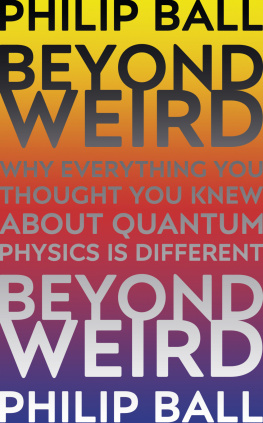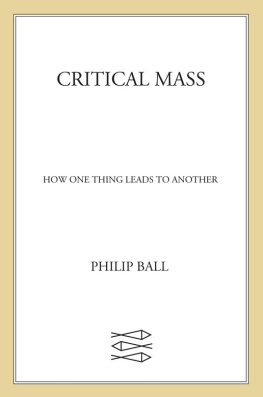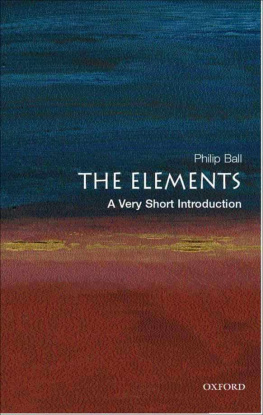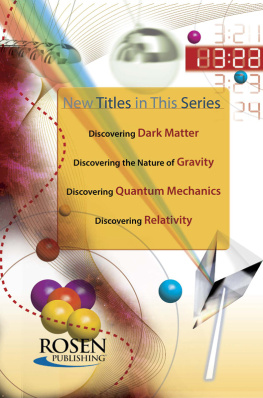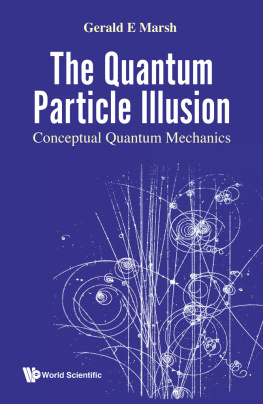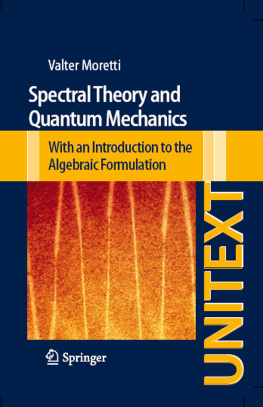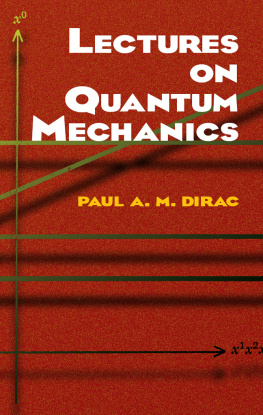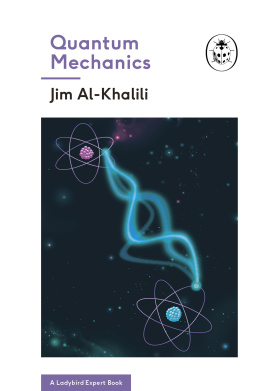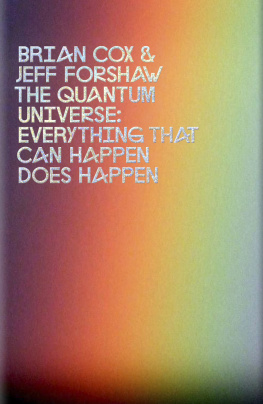Contents
About the Book
I think I can safely say that nobody understands quantum mechanics.
Richard Feynman wrote this in 1965 the year he was awarded the Nobel prize in physics for his work on quantum mechanics.
Quantum physics is regarded as one of the most obscure and impenetrable subjects in all of science. But when Feynman said he didnt understand quantum mechanics, he didnt mean that he couldnt do it he meant thats all he could do. He didnt understand what the maths was saying: what quantum mechanics tells us about reality.
Over the past decade or so, the enigma of quantum mechanics has come into sharper focus. We now realise that quantum mechanics is less about particles and waves, uncertainty and fuzziness, than a theory about information: about what can be known and how.
This is more disturbing than our bad habit of describing the quantum world as things behaving weirdly suggests. It calls into question the meanings and limits of space and time, cause and effect, and knowledge itself.
The quantum world isnt a different world: it is our world, and if anything deserves to be called weird, its us. This exhilarating book is about what quantum maths really means and what it doesnt mean.
About the Author
Philip Ball writes regularly in the scientific and popular media and worked for many years as an editor for physical sciences at Nature. His books cover a wide range of scientific and cultural phenomena, and include Critical Mass: How One Thing Leads To Another (winner of the 2005 Aventis Prize for Science Books), The Music Instinct, Curiosity: How Science Became Interested in Everything, Serving The Reich: The Struggle for the Soul of Science Under Hitler, Invisible: The History of the Unseen from Plato to Particle Physics and The Water Kingdom: A Secret History of China.
By way of introduction
To encounter the quantum is to feel like an explorer from a faraway land who has come for the first time upon an automobile. It is obviously meant for use, and important use, but what use?
John Archibald Wheeler
Somewhere in [quantum theory] the distinction between reality and our knowledge of reality has become lost, and the result has more the character of medieval necromancy than of science.
Edwin Jaynes
We must never forget that reality too is a human word just like wave or consciousness. Our task is to learn to use these words correctly that is, unambiguously and consistently.
Niels Bohr
[Quantum mechanics] is a peculiar mixture describing in part realities of Nature, in part incomplete human information about Nature all scrambled up by Heisenberg and Bohr into an omelette that nobody has seen how to unscramble.
Edwin Jaynes
Arguably the most important lesson of quantum mechanics is that we need to critically revisit our most basic assumptions about nature.
Yakir Aharonov et al.
I hope you can accept Nature as she is absurd.
Richard Feynman

I think I can safely say that nobody understands quantum mechanics.
Richard Feynman said that in 1965. In the same year he was awarded the Nobel Prize in Physics, for his work on quantum mechanics.
In case we didnt get the point, Feynman drove it home in his artful Everyman style. I was born not understanding quantum mechanics, he exclaimed merrily, [and] I still dont understand quantum mechanics! Here was the man who had just been anointed one of the foremost experts on the topic, declaring his ignorance of it.
What hope was there, then, for the rest of us?
Feynmans much-quoted words help to seal the reputation of quantum mechanics as one of the most obscure and difficult subjects in all of science. Quantum mechanics has become symbolic of impenetrable science, in the same way that the name of Albert Einstein (who played a key role in its inception) acts as shorthand for scientific genius.
Feynman clearly didnt mean that he couldnt do quantum theory. He meant that this was all he could do. He could work through the maths just fine he invented some of it, after all. That wasnt the problem. Sure, theres no point in pretending that the maths is easy, and if you never got on with numbers then a career in quantum mechanics isnt for you. But neither, in that case, would be a career in fluid mechanics, population dynamics, or economics, which are equally inscrutable to the numerically challenged.
No, the equations arent why quantum mechanics is perceived to be so hard. Its the ideas. We just cant get our heads around them. Neither could Richard Feynman.
His failure, Feynman admitted, was to understand what the maths was saying. It provided numbers: predictions of quantities that could be tested against experiments, and which invariably survived those tests. But Feynman couldnt figure out what these numbers and equations were really about: what they said about the real world.
One view is that they dont say anything about the real world. Theyre just fantastically useful machinery, a kind of black box that we can use, very reliably, to do science and engineering. Another view is that the notion of a real world beyond the maths is meaningless, and we shouldnt waste our time thinking about it. Or perhaps we havent yet found the right maths to answer questions about the world it purports to describe. Or maybe, its sometimes said, the maths tells us that everything that can happen does happen whatever that means.
This is a book about what quantum maths really means. Happily, we can explore that question without having to look very deeply into the maths itself. Even what little Ive included here can, if you prefer, be gingerly set aside.
I am not saying that this book is going to give you the answer. We dont have an answer. (Some people do have an answer, but only in the sense that some people have the Bible: their truth rests on faith, not proof.) We do, however, now have better questions than we did when Feynman admitted his ignorance, and that counts for a lot.
What we can say is that the narrative of quantum mechanics at least among those who think most deeply about its meaning has changed in remarkable ways since the end of the twentieth century. Quantum theory has revolutionized our concept of atoms, molecules, light and their interactions, but that transformation didnt happen abruptly and in some ways it is still happening now. It began in the early 1900s and it had a workable set of equations and ideas by the late 1920s. Only since the 1960s, however, have we begun to glimpse what is most fundamental and important about the theory, and some of the crucial experiments have been feasible only from the 1980s. Several of them have been performed in the twenty-first century. Even today we are still trying to get to grips with the central ideas, and are still testing their limits. If what we truly want is a theory that is well understood rather than simply one that does a good job at calculating numbers, then we still dont really have a quantum theory.

